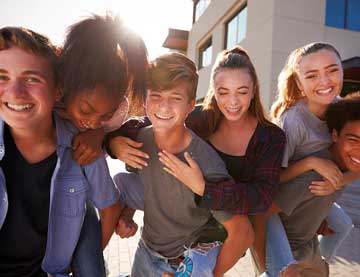Banner Image

Student well-being is a holistic term that encompasses all aspects of a student’s life. It underpins every aspect of the student’s growth and is defined as having a balanced state of positive psychological functioning. During covid we saw first-hand that resilience, adaptability, and well-being were all key aspects of coping with rapid change. Educators now understand that well-being is a fundamental component of the school experience and is just as important as academic achievement. The beauty about this concept is that anyone can play a role in nurturing the well-being of students. We simply need to create engaging communities that promote the well-being of all students and do so in a way that enhances their personal development and academic progress.
It’s important to note that having a positive well-being approach to life doesn't mean we have the feel-good vibes all the time. Students will feel a range of emotions on a day-to-day basis (as do many adults) from frustration to anxiety, excitement, and happiness. A targeted approach to well-being simply means a student is prepared to cope with day-to-day changes in a positive and constructive way.
How can we contribute to a student’s well-being?
There are several ways in which we can contribute to a student’s well-being and one of these is by creating supportive relationships, free from judgement, intentionally working on developing trust, and fostering learning environments that are inclusive.
Making students aware of how they treat one another and how their actions may influence others is crucial to everyone’s well-being, including teachers. Research shows that one of the first steps is to encourage learning environments where all members feel connected, all students have a shared responsibility, and feel that they are contributing to something that has meaning and purpose.
The goal of achieving a balanced lifestyle means we need to include managing our mental wellbeing needs. Having a positive mental state of mind simply means students can better regulate a range of emotions and confidently transition at each developmental stage.
Wellbeing Programs
Take your time to research and review some of the key student well-being outcomes you want to achieve in your classroom. There are many programmes available, and each school and state will have a range of frameworks and policies guiding schools on the principles to help promote wellbeing.
Programmes that meaningfully engage with students on a psychological, cognitive, social, physical level helps to increase their capabilities and helps to develop a balanced approach to life. Student well-being programmes integrated into the learning environment can be used to build more resilient communities. To support this theory several studies, show that students who participated in social emotional learning programmes (SEL) demonstrated improved attitudes and social and emotional skills.
There are several reviews and studies that agree the education system should contribute to the development of the child as a “whole” and that schools are now not just seen as educational institutes for academic performance but a place where students can learn to develop fundamental social, cognitive, and emotional skills. This may be as simple as learning to make friends or more complex issues such as cyber bullying.
If you are a parent or educator, I am certain you have caught yourself saying “we just didn’t have these sorts of things to navigate when I was that age” We live in a rapidly changing world with technology playing a large role in providing instant gratification and we now have a young generation who are not prepared to navigate the complexities of this hyper connectivity.
Values for Life offer interactive incursion programmes that use evidence-based research to educate and help students better understand important topics such as bullying, empathy, leadership, drug and alcohol education and cyber safety to help build resilience in a safe and structured environment. Read more here
Supreme Incursions is another program supplier that aims to deliver inspiring, and hands-on educational experiences in Victoria. They purposefully create new opportunities for students of all ages and backgrounds to become curious learners through innovative and inspiring real-life exploration. Read more here
Kids giving back is another programme that helps students develop resilience and self-efficacy.
They believe that a true education not only includes fractions, essays and tests but is also about empowering kids to become caring, socially minded citizens. Kids Giving back programs provide holistic volunteering experiences for students that are designed to educate on the importance of real-world issues while imparting values of compassion and service. This unique approach makes these programmes meaningful and can quite literally become transformative learning experiences. Read more here
These types of programs can positively contribute to the overall growth of a child and the outcomes often support the theory that there is a reciprocal relationship between social and emotional learning, school engagement and academic learning outcomes.
While we have focused primarily on student wellbeing, we cannot overlook the importance of educator wellbeing. We have already highlighted just how central wellbeing is to the experience of students at school but what about our teachers? Being a teacher in today's world looks very different to teaching 10/15/ 20 years ago. The expectations, pressures and challenges have mounted exponentially. Teachers should be mindful of setting acceptable boundaries and making time for the things they love doing. I have heard many teachers refer to their students as their children, it’s important to recognise your needs and practise the same positive mental wellbeing strategies we encourage our students to learn from.
One of the key takeaway points in researching the topic of student well-being is that this is a whole community approach. Schools are only one part of the journey to create resilient and robust students. Parents, extended family, and social role models all have a role to play in promoting a positive attitude towards life. More importantly having the confidence and positive attitude to deal with life’s challenges when things don’t always go our way is a skill that will be utilised well into adulthood.
